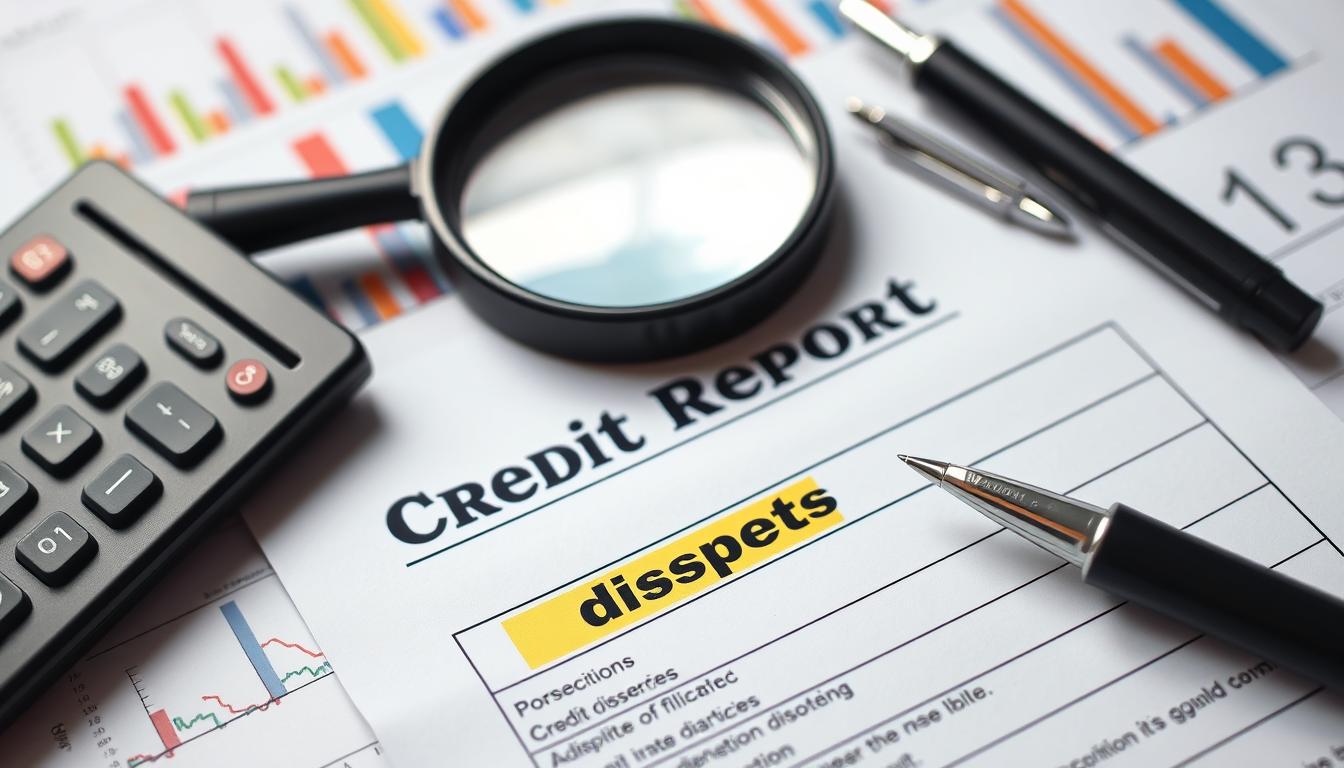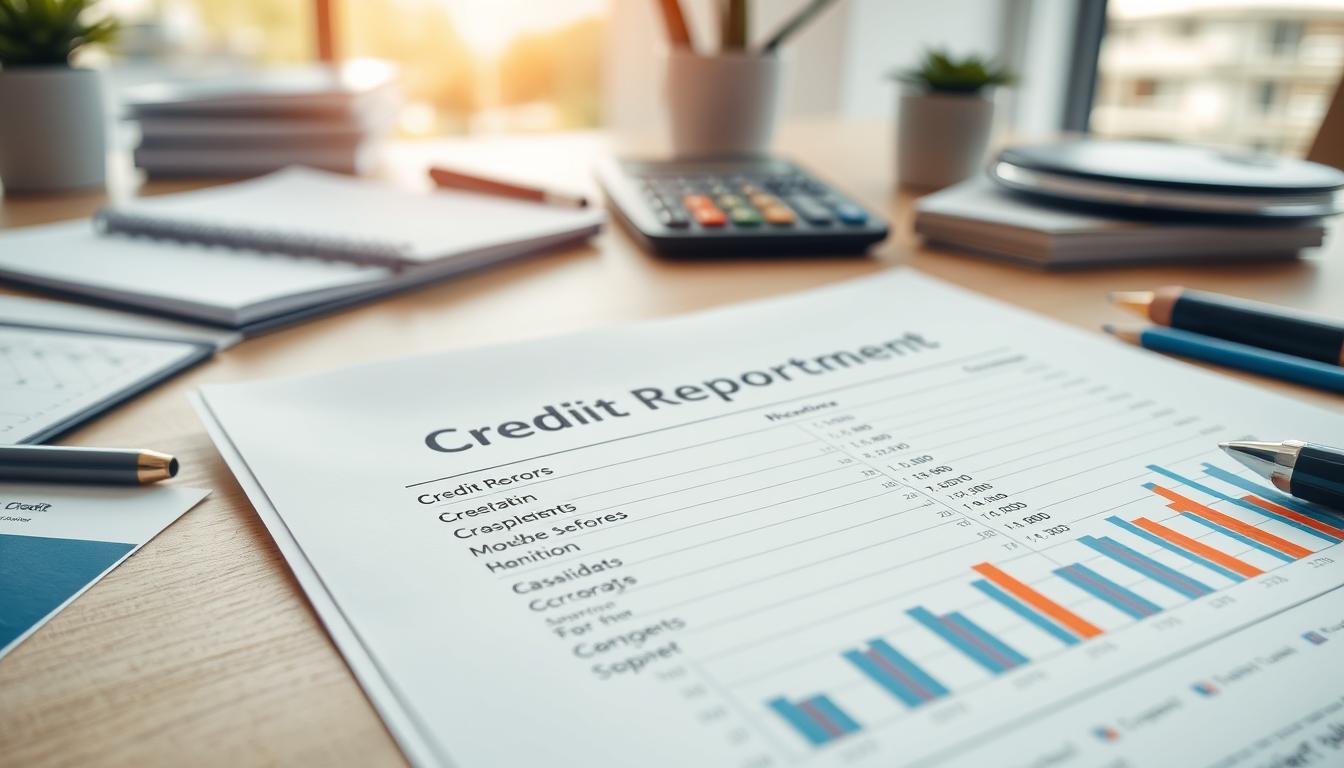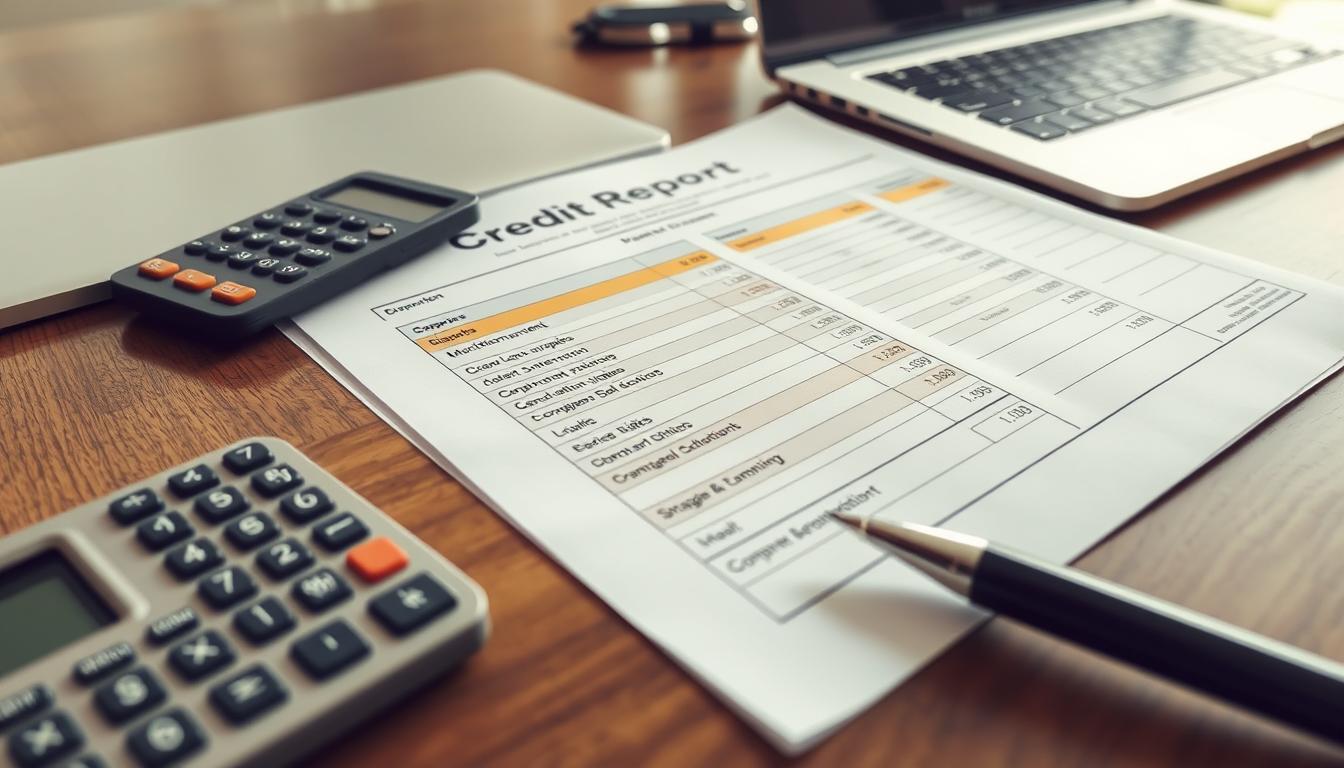A clean, accurate credit report is vital for your financial health. It affects loan terms, interest rates, and credit opportunities. Disputes and errors can harm your credit score and financial standing.
This guide will show you how to remove disputes from your credit report. You’ll learn to clear dispute comments and take charge of your financial future.
Key Takeaways
Understanding Credit Report Disputes
Your credit report shows your financial history and creditworthiness. Sometimes, it may contain wrong info or negative marks. Credit report disputes help fix these errors.
Disputes challenge and correct wrong information on your credit file. They’re important for keeping your financial record accurate.
What Are Credit Report Disputes?
Credit report disputes are formal requests to credit bureaus. They ask Experian, Equifax, and TransUnion to investigate wrong info. Consumers can start disputes when they spot issues.
Common Reasons for Disputes
People file credit report disputes for several reasons. These include:
- Incorrect personal information, such as your name, address, or date of birth
- Erroneous account details, including balances, payment history, or account status
- The presence of negative items or derogatory marks that should not be on your credit file
- Fraudulent accounts or identity theft-related information
Fixing these issues through disputes improves credit report accuracy. This helps maintain a healthy financial profile.

“Accurate credit reports are essential for consumers to maintain a healthy financial profile and access credit, housing, and employment opportunities.”
| Reason for Dispute | Example |
|---|
| Incorrect personal information | Your name is misspelled or your address is outdated |
| Erroneous account details | A closed account is still showing as open or a paid-off debt is still reporting as unpaid |
| Negative items or derogatory marks | A late payment or collection account that should have been removed from your credit report |
| Fraudulent accounts or identity theft | An account that was opened without your knowledge or due to identity theft |
Knowing why disputes happen helps you keep your credit info accurate. This is key for reaching your money goals.
The Importance of Accurate Credit Reports
An accurate credit report is vital for a healthy credit score. It affects credit card applications, loan approvals, and other financial deals. Wrong info can lower your credit score, making it harder to get credit.
Check your credit report often to keep it correct. Errors like wrong account details or missed payments can hurt your credit score. These mistakes can make it tough to get credit or good terms.
Fraudulent activities on your report can also damage your credit standing. Spotting and fixing these issues quickly is crucial for your financial health.
- Inaccurate credit report information can lead to higher interest rates on loans and credit cards.
- Errors on your credit report can also cause difficulties in obtaining credit card applications and loan approvals.
- Unresolved disputes on your credit report can have long-lasting consequences on your financial well-being.
Fix any issues on your credit report right away. This helps keep your credit score strong. It also ensures you get the best financial deals possible.
“A single error on your credit report can have a significant impact on your financial future.”

Steps to Remove Disputes From Your Credit Report
Removing disputes from your credit report requires planning and organization. Follow these steps to address credit report errors affecting your score. You can navigate the credit bureau dispute process effectively.
Gather Supporting Documentation
Start by collecting all relevant supporting documentation. This includes credit report copies, payment receipts, and letters from creditors. Organize this information clearly to present your case effectively.
Having well-organized evidence will strengthen your position when dealing with credit bureaus. It makes the process smoother and more likely to succeed.
Contact the Credit Bureaus
Next, initiate the credit bureau dispute process. Contact the bureaus by mail, online, or phone. Clearly explain your specific disputes and provide supporting documentation.
| Credit Bureau | Contact Information |
|---|
| Experian | P.O. Box 4500, Allen, TX 75013 |
| Equifax | P.O. Box 740256, Atlanta, GA 30374 |
| TransUnion | P.O. Box 2000, Chester, PA 19022 |
Credit bureaus must investigate your disputes within 30 days by law. Stay patient and persistent throughout the process. Follow up if you don’t receive a satisfactory resolution.

Dealing with Persistent Disputes
Credit report disputes can sometimes linger after credit bureaus respond. In these cases, follow-up is crucial. This ensures a timely and satisfactory resolution of inaccuracies.
Follow Up with Credit Bureaus
The Fair Credit Reporting Act gives credit bureaus 30 days to investigate disputes. If unresolved, consumers should follow up promptly. Persistence is key to removing persistent credit report disputes.
When following up with credit bureaus, document all communication thoroughly. Resubmit supporting documents from the initial dispute. Clearly explain why the issue remains unresolved.
Use the credit bureau’s dispute resolution process effectively. This may include escalating to a supervisor or requesting a reinvestigation.
- Document all communication, including dates, names of representatives, and the details of each interaction.
- Resubmit any supporting documentation that was provided in the initial dispute.
- Clearly explain why the dispute remains unresolved and reiterate your request for a timely resolution.
- Utilize the credit bureau’s dispute resolution process, which may include escalating the issue to a supervisor or requesting a reinvestigation.
Stay organized during the credit bureau follow-up process. This helps ensure your credit report accurately reflects your financial history.

Persistent follow-ups with credit bureaus empower consumers. They can tackle persistent credit report disputes and safeguard their financial well-being.
The Fair Credit Reporting Act and Your Rights
The Fair Credit Reporting Act (FCRA) protects your credit information. It helps you fix mistakes in your credit reports. This federal law ensures your credit history stays accurate.
The FCRA gives you rights to dispute credit report errors. You can get a free yearly credit report from Experian, Equifax, and TransUnion. You can challenge any mistakes you find.
Credit bureaus must investigate and fix verified issues. They’re legally required to do this when you report problems.
- The right to access your credit report: You can obtain a free copy of your credit report from each of the three major credit bureaus once a year.
- The right to dispute inaccurate information: If you find any errors or incomplete information on your credit report, you can dispute it with the credit bureaus.
- The right to have disputes investigated: The credit bureaus are required by law to investigate and correct any verified inaccuracies on your credit report.
- The right to have negative information removed: If the credit bureaus are unable to verify the accuracy of negative information, they must remove it from your credit report.
Knowing your Fair Credit Reporting Act rights helps you control your credit history. You can address disputes and keep your credit profile accurate.
By using these rights, you can fix errors and maintain a fair credit record.
“The Fair Credit Reporting Act is a crucial safeguard for consumers, ensuring that their credit information is accurate, fair, and accessible.”
| Key Rights Under the FCRA | Description |
|---|
| Free Credit Reports | Consumers are entitled to one free credit report per year from each of the three major credit bureaus. |
| Dispute Inaccuracies | Consumers can dispute any errors or incomplete information on their credit reports with the credit bureaus. |
| Investigate Disputes | Credit bureaus are legally required to investigate and correct any verified inaccuracies on a consumer’s credit report. |
| Removal of Negative Items | If credit bureaus cannot verify the accuracy of negative information, they must remove it from the consumer’s credit report. |
Remove Disputes From Credit Report
Removing disputes from your credit report is vital for a healthy financial profile. It ensures your creditworthiness is accurately reflected. This process involves communicating with creditors and negotiating with collection agencies.
Gather all necessary documentation to support your case. This includes payment records and correspondence with creditors. Contact credit bureaus directly to start the dispute resolution process.
If disputes persist, follow up with credit bureaus. Ensure your concerns are being addressed. Persistence is key in removing disputes from credit report.
Consider seeking help from a credit report cleanup or credit repair professional. These experts know the credit reporting system well. They can often achieve more effective results in dispute removal.
“Maintaining a clean and accurate credit report is essential for building financial stability and achieving your long-term goals. By taking proactive steps to address and resolve any disputes, you can take control of your credit profile and unlock new opportunities.”
Successful credit report cleanup requires diligence and attention to detail. Advocate for your financial well-being. With the right approach, you can improve your credit profile.
Preventing Future Credit Report Disputes
Accurate credit reports are vital for a strong financial foundation. Regular monitoring helps prevent future disputes. Stay vigilant to protect your credit score and avoid hassles.
Monitoring Your Credit Reports
Review your credit reports from Experian, Equifax, and TransUnion regularly. This helps identify errors before they impact your credit score. Many services offer free or low-cost credit report monitoring.
Set up alerts for changes to your credit reports. Check your reports at least yearly, if not more often. Look for incorrect information, such as wrong accounts or payment history.
- Set up automated alerts to notify you of changes to your credit reports
- Review your credit reports at least once a year, or more frequently if possible
- Carefully check for any incorrect or incomplete information, such as erroneous accounts or payment history
Quick action makes maintaining accurate credit information easier. Catch and resolve issues early to protect your financial well-being. Proactive measures help prevent serious credit report disputes.
Professional Credit Repair Services
Credit report disputes can be complex and time-consuming. Fortunately, professional credit repair services are here to help. These experts have the know-how to handle credit report corrections effectively.
Credit repair professionals offer many benefits. They review your credit report and spot inaccuracies. Then, they dispute these items with credit bureaus. This saves you time and boosts your chances of success.
These services also guide you in building a strong credit profile. They provide tailored strategies to boost your credit score. A better score can lead to better loan and credit card terms.
If you’re dealing with credit report issues, consider a reputable credit repair company. They can help you take charge of your financial future. With their help, you can achieve the credit score you deserve.
“Working with a credit repair expert was a game-changer for me. They were able to resolve long-standing disputes on my credit report, which ultimately helped me secure a better mortgage rate and save thousands in interest payments.”
| Benefits of Professional Credit Repair Services | Key Considerations |
|---|
- Expertise in credit report dispute resolution
- Increased efficiency in removing inaccuracies
- Personalized strategies for credit score improvement
- Guidance on building and maintaining a strong credit profile
| - Thoroughly research and vet credit repair companies
- Understand the fees and services provided
- Ensure the company operates within legal and ethical boundaries
- Maintain active involvement in the credit repair process
|
Credit Score Impact of Disputes
Resolving credit report disputes can significantly impact your credit score. When resolved, accurate information replaces errors in your credit file. This leads to positive changes in your overall credit standing.
Addressing disputes improves your credit score. It shows your credit history is reliable and current. Lenders value this when assessing your creditworthiness.
Resolving disputes may boost your credit score. This can enhance your financial opportunities and well-being. The goal is to ensure accurate reflection of your financial history.
An accurate credit report empowers you. It helps you make informed decisions about your financial future. It also supports you in achieving your financial goals.
FAQ
What are credit report disputes?
Credit report disputes challenge incorrect info on your credit report. This includes wrong personal details, account errors, or unfair negative items. Disputes aim to fix these issues.
Why is it important to have an accurate credit report?
An accurate credit report is vital for your financial health. It affects your credit score, which lenders and employers use. Wrong info can make getting loans or credit cards harder.
How can I remove disputes from my credit report?
To remove disputes, gather proof and contact credit bureaus directly. Clearly explain the errors and provide evidence. Follow up if needed to ensure your report is fixed.
What rights do I have under the Fair Credit Reporting Act?
The Fair Credit Reporting Act gives you important rights. You can dispute wrong info and get errors fixed quickly. You also get a free yearly credit report.
How can I prevent future credit report disputes?
Keep an eye on your credit reports regularly. Learn what info they should contain. Address any errors quickly.Set up ongoing credit monitoring. Talk to your creditors often. Take steps to keep your credit info accurate.
When should I consider seeking professional credit repair services?
Consider professional help if you face tough or ongoing credit disputes. Experts can handle the process more efficiently. They can talk to credit bureaus and boost your credit standing.
How can credit report disputes impact my credit score?
Fixing credit report errors can boost your credit score. It ensures your credit file has correct, current info. This can improve your chances of getting better credit deals.
Remove Disputes From Credit Report | Clear Dispute Comments
A clean, accurate credit report is vital for your financial health. It affects loan terms, interest rates, and credit opportunities. Disputes and errors can harm your credit score and financial standing.
This guide will show you how to remove disputes from your credit report. You’ll learn to clear dispute comments and take charge of your financial future.
Key Takeaways
Understanding Credit Report Disputes
Your credit report shows your financial history and creditworthiness. Sometimes, it may contain wrong info or negative marks. Credit report disputes help fix these errors.
Disputes challenge and correct wrong information on your credit file. They’re important for keeping your financial record accurate.
What Are Credit Report Disputes?
Credit report disputes are formal requests to credit bureaus. They ask Experian, Equifax, and TransUnion to investigate wrong info. Consumers can start disputes when they spot issues.
Common Reasons for Disputes
People file credit report disputes for several reasons. These include:
Fixing these issues through disputes improves credit report accuracy. This helps maintain a healthy financial profile.
Knowing why disputes happen helps you keep your credit info accurate. This is key for reaching your money goals.
The Importance of Accurate Credit Reports
An accurate credit report is vital for a healthy credit score. It affects credit card applications, loan approvals, and other financial deals. Wrong info can lower your credit score, making it harder to get credit.
Check your credit report often to keep it correct. Errors like wrong account details or missed payments can hurt your credit score. These mistakes can make it tough to get credit or good terms.
Fraudulent activities on your report can also damage your credit standing. Spotting and fixing these issues quickly is crucial for your financial health.
Fix any issues on your credit report right away. This helps keep your credit score strong. It also ensures you get the best financial deals possible.
Steps to Remove Disputes From Your Credit Report
Removing disputes from your credit report requires planning and organization. Follow these steps to address credit report errors affecting your score. You can navigate the credit bureau dispute process effectively.
Gather Supporting Documentation
Start by collecting all relevant supporting documentation. This includes credit report copies, payment receipts, and letters from creditors. Organize this information clearly to present your case effectively.
Having well-organized evidence will strengthen your position when dealing with credit bureaus. It makes the process smoother and more likely to succeed.
Contact the Credit Bureaus
Next, initiate the credit bureau dispute process. Contact the bureaus by mail, online, or phone. Clearly explain your specific disputes and provide supporting documentation.
Credit bureaus must investigate your disputes within 30 days by law. Stay patient and persistent throughout the process. Follow up if you don’t receive a satisfactory resolution.
Dealing with Persistent Disputes
Credit report disputes can sometimes linger after credit bureaus respond. In these cases, follow-up is crucial. This ensures a timely and satisfactory resolution of inaccuracies.
Follow Up with Credit Bureaus
The Fair Credit Reporting Act gives credit bureaus 30 days to investigate disputes. If unresolved, consumers should follow up promptly. Persistence is key to removing persistent credit report disputes.
When following up with credit bureaus, document all communication thoroughly. Resubmit supporting documents from the initial dispute. Clearly explain why the issue remains unresolved.
Use the credit bureau’s dispute resolution process effectively. This may include escalating to a supervisor or requesting a reinvestigation.
Stay organized during the credit bureau follow-up process. This helps ensure your credit report accurately reflects your financial history.
Persistent follow-ups with credit bureaus empower consumers. They can tackle persistent credit report disputes and safeguard their financial well-being.
The Fair Credit Reporting Act and Your Rights
The Fair Credit Reporting Act (FCRA) protects your credit information. It helps you fix mistakes in your credit reports. This federal law ensures your credit history stays accurate.
The FCRA gives you rights to dispute credit report errors. You can get a free yearly credit report from Experian, Equifax, and TransUnion. You can challenge any mistakes you find.
Credit bureaus must investigate and fix verified issues. They’re legally required to do this when you report problems.
Knowing your Fair Credit Reporting Act rights helps you control your credit history. You can address disputes and keep your credit profile accurate.
By using these rights, you can fix errors and maintain a fair credit record.
Remove Disputes From Credit Report
Removing disputes from your credit report is vital for a healthy financial profile. It ensures your creditworthiness is accurately reflected. This process involves communicating with creditors and negotiating with collection agencies.
Gather all necessary documentation to support your case. This includes payment records and correspondence with creditors. Contact credit bureaus directly to start the dispute resolution process.
If disputes persist, follow up with credit bureaus. Ensure your concerns are being addressed. Persistence is key in removing disputes from credit report.
Consider seeking help from a credit report cleanup or credit repair professional. These experts know the credit reporting system well. They can often achieve more effective results in dispute removal.
Successful credit report cleanup requires diligence and attention to detail. Advocate for your financial well-being. With the right approach, you can improve your credit profile.
Preventing Future Credit Report Disputes
Accurate credit reports are vital for a strong financial foundation. Regular monitoring helps prevent future disputes. Stay vigilant to protect your credit score and avoid hassles.
Monitoring Your Credit Reports
Review your credit reports from Experian, Equifax, and TransUnion regularly. This helps identify errors before they impact your credit score. Many services offer free or low-cost credit report monitoring.
Set up alerts for changes to your credit reports. Check your reports at least yearly, if not more often. Look for incorrect information, such as wrong accounts or payment history.
Quick action makes maintaining accurate credit information easier. Catch and resolve issues early to protect your financial well-being. Proactive measures help prevent serious credit report disputes.
Professional Credit Repair Services
Credit report disputes can be complex and time-consuming. Fortunately, professional credit repair services are here to help. These experts have the know-how to handle credit report corrections effectively.
Credit repair professionals offer many benefits. They review your credit report and spot inaccuracies. Then, they dispute these items with credit bureaus. This saves you time and boosts your chances of success.
These services also guide you in building a strong credit profile. They provide tailored strategies to boost your credit score. A better score can lead to better loan and credit card terms.
If you’re dealing with credit report issues, consider a reputable credit repair company. They can help you take charge of your financial future. With their help, you can achieve the credit score you deserve.
Credit Score Impact of Disputes
Resolving credit report disputes can significantly impact your credit score. When resolved, accurate information replaces errors in your credit file. This leads to positive changes in your overall credit standing.
Addressing disputes improves your credit score. It shows your credit history is reliable and current. Lenders value this when assessing your creditworthiness.
Resolving disputes may boost your credit score. This can enhance your financial opportunities and well-being. The goal is to ensure accurate reflection of your financial history.
An accurate credit report empowers you. It helps you make informed decisions about your financial future. It also supports you in achieving your financial goals.
FAQ
What are credit report disputes?
Why is it important to have an accurate credit report?
How can I remove disputes from my credit report?
What rights do I have under the Fair Credit Reporting Act?
How can I prevent future credit report disputes?
When should I consider seeking professional credit repair services?
How can credit report disputes impact my credit score?
You May Also Like:
Lillian Morgan
Lillian Morgan
Blogger & Writer
Content writer for AI Credit Repair
The AI Credit Repair Tool That Helps You Build Credit